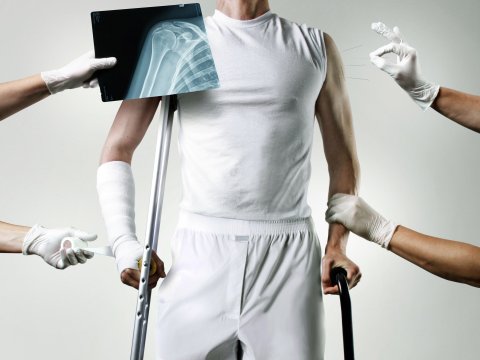Taking charge of your health means more than following expert advice blindly. It includes educating yourself about hidden influences that may affect your care—and ways you can signal to your doctors that you're not just interested in a quick fix, but in the right answer. Veteran former Time health reporter and host of public radio's Dueling Docs: The Cure to Contradictory Medicine, Janice M. Horowitz, deftly exposes background forces that can compromise care in her new book, Health Your Self (Post Hill Press, September 21). In this excerpt, she discusses how patient satisfaction surveys can skew doctors' treatment recommendations to your detriment and what you can do to ensure your doctors dispense the best medicine.

If you're like me, you ignored your health woes large and small this past year, terrified that if you stepped foot in a medical center, packed with people sick from COVID-19, you'd wind up infected. Sometimes you did fine: the splinter worked its way out, your sniffles vanished. But other times, disastrously. Someone I know was too terrified to go to the E.R. when his vision turned blurry and by the time his wife convinced him, it was too late.
Now, with some measure of tepid freedom in many areas of the country, thanks to vaccines and fewer COVID deaths, we're willing, at last, to take care of ourselves.
Before you do, be warned: there's a hidden force at work every time you show up at medical centers such as urgent care and emergency rooms.
That hidden force is you.
Doctors in urgent care practices, emergency rooms, as well as some large medical centers, are particularly attuned to patient experience surveys that you may have filled out. Their interest in satisfying the patient may be not just to heal, but to gain high marks. My daughter had a killer earache that seemed to come out of nowhere, for which we rushed her to urgent care. The doctor's prescription of antibiotics—which were not necessary for this new, feverless infection—and frequent double doses of over-the-counter painkillers was an easy way to show that he was doing all he could, and, if he was lucky, this would be his ticket to a five-star rating.
Good ratings aren't merely good for a doctor's ego. They come with perks. Better-rated doctors, particularly in urgent care, are rewarded with higher status in the clinic, and are less likely to work nights, weekends and holidays. In an emergency room, a doctor can't get promoted if he or she consistently comes in with bad ratings. In fact, that's pretty much true at any medical center that conducts patient surveys.
The result is that you, who have never been to medical school and don't have clinical experience, are empowered with a disproportionate say in how well a doctor seems to be doing his job.
Career-driven medical decisions by E.R. and urgent care doctors occur with more than just earaches. People are overtreated with antibiotics for the flu, sore throats and sinus infections. One study on respiratory infections, for which antibiotics are generally not recommended, found that among the physicians who prescribe antibiotics infrequently, only a few achieve even the 50th percentile on satisfaction ratings. But almost all physicians who rank above the 90th percentile prescribe antibiotics frequently. Research by Ateev Mehrotra, associate professor of health care policy at Harvard Medical School, also shows that if urgent care patients are prescribed antibiotics and get better, they are more likely to return to the same center, even though the antibiotics may have had nothing to do with the improved health. In emergency rooms, it's the same drill, but here, patients can be all too easily rushed to high-radiation-emitting CT scans, and all manner of unnecessary tests.
Patient satisfaction surveys are pivotal in today's health care delivery, and have become a huge booming business unto themselves. There are currently thousands of performance measures and quality models applicable to clinicians. More than $15 billion is spent annually by U.S. physician practices simply on reporting performance. They are far more significant than the online reviews we read on Yelp, Healthgrades, and ZocDoc.
Patient experience surveys, for obvious reasons, don't directly ask a patient if a doctor knows what he's doing on a clinical level, such as whether he treated your heart attack properly. Rather, they skirt around that data point by asking if a doctor listened to you and whether things were explained properly. They will also ask about your overall satisfaction and for an overall rating.
All of these questions may sound fine, but they lead to distortions. The doctors are constantly worried about them and may take shortcuts to please you rather than necessarily give you the appropriate care because it's easier to be a nice guy. You wind up grading your doctor based on a set of metrics that may have little to do with the care you receive. Whether a doctor is courteous, which, though important, doesn't necessarily speak of clinical skill. Or whether the wait time was too long. Or the room too noisy.
What Can You Do?
Your goal, when you find yourself in a center that might use surveys—and you can be sure they do in E.R.s and urgent care facilities—is to neutralize any influence that survey pressure is exerting on your physician. Right there, in the moment. Turns out, it's not that hard to turn things around.
The first and most crucial step is all about you. You'll have to temper your expectations so that you genuinely understand that it's okay to walk out without a prescription or test. The second trick is to change your doctor's expectations so he knows you're not the kind of test-happy, drug-demanding patient he might be accustomed to. You are a different breed. You'll have to communicate that to please you—hint, hint, you'll be more likely to give him a better rating—he'll have to be judicious in his care, and that what you value most is not necessarily active treatment, but the time it takes to explain why a medicine or test may or may not be needed.
Which, as it happens, is something you'll be questioned on in the survey. Your doctors are likely overworked, so time for you may be the hardest thing to garner. In some urgent care centers, doctors report that they will see up to 70 patients over the course of a 12-hour day, translating to about 10 minutes per patient. And in the E.R., the American College of Emergency Physicians recommends an average of 30 minutes with a patient, which sounds like a lot. But even if that's ever achieved, it, too, is often barely enough.
Let your doctor know that giving you a few extra minutes, and not reflexively handing you something he thinks you may want, is key to a good rating. You can say something like this: "Whatever you decide, even if you think I need nothing, I'm on board. Just as long as you take the time to think through my case and explain your thinking. That's the most important thing to me, and that's what would make my experience here great!" (Be sure to subtly work in the word "experience," as in "patient experience," which he'll know relates to surveys.)
There are also specific red flags that suggest your doctor is more worried about bucking for a good grade than treating you appropriately. Here are three main ones:

Antibiotics → Overprescribing antibiotics is one of the most common survey-driven mistakes made to keep you happy. Make it clear that you are not interested in taking antibiotics unless you absolutely need them. If you're feeling very confident, you might want to ask if there is a guideline from a medical society that backs up the use of antibiotics for the condition that brought you in. For example, the American Academy of Pediatrics recommends waiting 48 hours, and the presence of a high fever, before prescribing antibiotics for children with earaches.
Painkillers → Unless you are in tear-your-hair-out, unbearable pain, avoid narcotic painkillers which fueled the opioid epidemic still plaguing our country. Don't betray the slightest hint that you expect or in any way want a narcotic for your pain. Communicate instead that alternatives may translate into many high marks on a survey.
The good news is that a groundbreaking study in the Journal of the American Medical Association on dental pain found that combining nonopioid drugs such as acetaminophen (Tylenol), and ibuprofen (Advil, Motrin) is as effective in treating pain as opioid-based drugs. And just last year, the FDA approved the first over-the-counter acetaminophen and ibuprofen combination drug called Advil Dual Action.
Even for migraines, for which sufferers routinely go to the E.R. asking for opioids, there are other options. Besides acetaminophen (along with caffeine), or ibuprofen, there are migraine-specific, opioid-free prescription drugs you can take called triptans, such as sumatriptan (Imitrex and generic). Make it clear how happy you will be with nonopioid prescriptions and good, old-fashioned, over-the-counter pills.
CT Scans for Head Injuries → Most patients don't come into an E.R. demanding a CT scan. But there's one group that reliably does: mothers. Thanks to heightened awareness about the seriousness of concussions, moms these days practically beg for a CT scan for the slightest bump to their kids' heads. But CT scans deliver hundreds of times the amount of radiation of conventional X-rays. It's easier for an eager-to-please E.R. doctor to appease a worried mom by offloading his diagnosis to the CT scanner rather than make his own clinical judgment. Asking for one will back him into a corner and raise his concern that if he doesn't comply, you'll exact revenge on the survey.
Of course, anyone should absolutely get a CT scan in an emergency room if your doctor can convince you that the benefits outweigh the risk. Worthy reasons among many include a head injury so severe that you are knocked unconscious or so confused you can't string a sentence together. Or a severely broken bone close to a vital organ, such as the heart.
But for many conditions, there are alternatives to CT. MRIs deliver zero X-rays. They take about 45 minutes to perform, so emergency rooms are rarely equipped to perform them, under the assumption that emergencies need to be handled quickly. You might want to ask how risky it is to wait until you can get to an imaging center for an MRI. Or you can ask if a simple, conventional X-ray or even two or three of them, will suffice, instead of a super-charged CT scan. The idea is to make yourself part of the discussion, in a reasonable way, which should slow things down and take the attention off of surveys and keep them focused firmly on you as an individual.
One place you're least likely to bump up against surveys is with your private physician. Urgent care is great for splinters, broken bones, wounds and situations where the treatment is straightforward. And E.R.s are the place to go for chest pains and other clear emergencies. But your own doctor knows you, has a chart on you with background to refer to, holds fewer concerns over his rating and is less likely to reflexively hit you with tests and medications. There may be other concerns uppermost on his mind, but at least, not surveys. And for that fact alone, he would warrant the highest rating, as any doctor you've chosen should.

→ Excerpt adapted from Health Your Self by Janice M. Horowitz, published by Post Hill Press.













